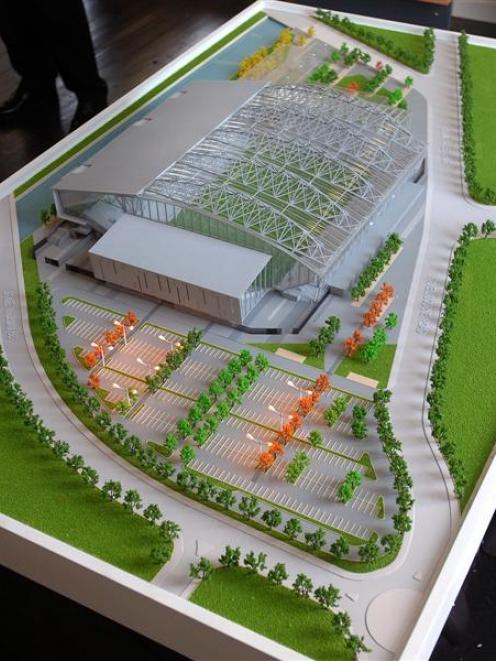
When I visualise the new Otago Stadium in 2012, I see a lively, dynamic arena that will serve the whole of the region south of the Waitaki.
I see it primarily as a hub for tertiary education, the community, sport and entertainment.
The stadium will become a magnet for activities, including health and physical activity programmes, rehabilitation, research and technology, as well as providing leading sports medicine facilities, a conferencing venue and a world-class sports arena.
The university campus, outgrowing its existing precincts, could resolve some of its urgent space demands through the stadium complex, linked by regular transport services via the university to the city.
A new stadium will complement the existing Logan Park complex, unique in its mix of international-class facilities for cricket, hockey, tennis and athletics.
[comment caption=Do you agree with David Gerrard?]
These currently sit within a stone's throw of the country's most prestigious research-informed university.
World-leading research and consulting in health and human performance are exciting potential outcomes.
An obvious partnership fits with the university's Division of Health Sciences, which includes schools of medicine, dentistry, pharmacy and physiotherapy as well as the medical laboratory science programme.
Academic activities in exercise prescription based in the School of Physical Education, sports nutrition expertise from the Department of Human Nutrition and the potential relocation of the University Student Health and Counselling Service and the Unipol Recreation Centre would create an academic campus unparalleled in this country or possibly even Australasia.
These thoughts describe a possible vision for the Awatea development.
In a current climate of economic downturn, Dunedin and the region deserves an injection of innovative, positive thinking.
A covered stadium has enormous possibilities in terms of its daily use, and the complementary development of services and facilities.
This unique development has the ability to become a real "hub", combining:
• Educational facilities.
• Student services - health, physical activity, recreation.
• A credible and attractive test venue.
• Entertainment and events - from community to a national scale.
• Community sports days and events - from children to elite sport.
• Sports services - New Zealand Academy of Sport, sports medicine consulting and services, technological developments using the indoor space and its controlled environment.
• Training base for teams.
• Conferencing and hospitality.
The stadium development, if managed strategically by the city and region, can build on Dunedin's world-class reputation in human performance and endeavour.
That reputation is based on physical activity, research and consulting, sports medicine, health (in fields such as nutrition and diabetes research), human and high performance and sports technology.
The work of the university in this area is outstanding, the NZ Academy of Sport has established a national presence and reputation in this area, and the sports technology sector is already making a mark around the globe.
What makes this level of achievement possible in Dunedin is the unusual mix of resources and experience which work to create a competitive advantage: our people, facilities, track record and environment.
• The people and expertise within the city and university.
• Our local track record over decades.
The first area to champion sports medicine and sports science and the first to have schools of physical education and nutrition and a Human Performance Centre.
• The environment.
The ability to mix research and academic life with the real world of athletes, the public, coaches, etc.
All close and accessible, supported by the best people, facilities and resources.
• The facilities.
The swimming flume (which measures swimmers' performance in controlled conditions), environmental chamber, labs, the pool, the athletics track and playing fields all in close proximity.
Dunedin is now the base for the NZ high-performance sport Innovation and Technology programme.
• The established base for the NZ Academy of Sport.
A national training base for a number of programmes and activities: major programmes in netball, cricket, cycling, athletics, triathlon, plus the national base for winter sports, the New Zealand Motorsport programme and the New Zealand altitude training base.
The range of sports services and innovations happening in Dunedin is unmatched elsewhere in New Zealand.
• Our technology and technical development capability is the best in New Zealand by far.
Having an indoor arena of this scope in the form of the new stadium will enable sports researchers, trainers and players to step up yet again and undertake analysis and developments not possible today.
For high performance sport, it will enable Dunedin to offer training services which are not currently available anywhere else in New Zealand.
From a rugby point of view this development is vital. The cost of losing test and Super 14 rugby to this region is huge.
In economic terms, the last international was estimated to have generated $7.3 million in direct value. But more than the dollars and cents contribution, the new stadium will have a significant role-modelling benefit, give access for young people to top-class sport and provide publicity and brand promotion around the world via broadcasting of significant value to Dunedin and Otago.
While a $188 million development is big, it is not as big as the Milton jail or other social investments in health, welfare and justice which focus at the bottom of the cliff.
The new stadium is about progress, community good, future-proofing, and leaving an outstanding legacy facility.
What this development can do for this region is huge - with benefits which extend well beyond sport and the university.
It is about opening up positive opportunities for our future and catapulting Dunedin right back to the front of the pack by playing to our strengths.
David Gerrard is Associate Professor and Associate Dean, Faculty of Medicine, University of Otago.











